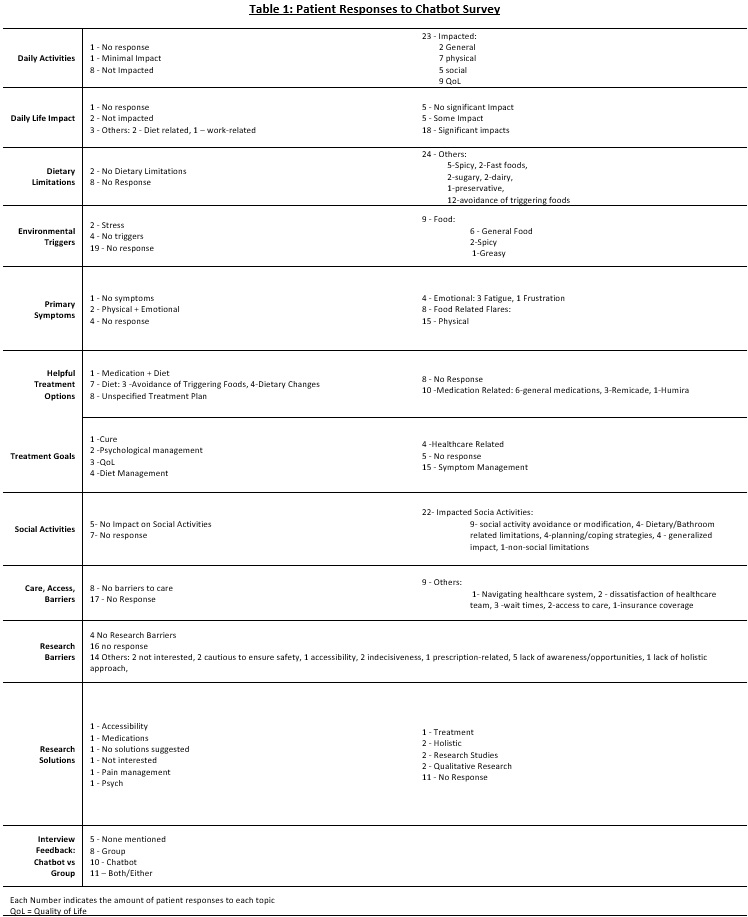Sunday Poster Session
Category: IBD
P1064 - Using a Chatbot to Administer a Questionnaire in IBD: A Pilot Study
Sunday, October 26, 2025
3:30 PM - 7:00 PM PDT
Location: Exhibit Hall

Kennedy Watson, MD (she/her/hers)
Morehouse School of Medicine
Atlanta, GA
Presenting Author(s)
Brian Xu, MD1, Kennedy Watson, MD1, Rose Li, MD1, Kely Norel, PhD2, Bo Wen, PhD2, Jesus Luevano, MD1, Julia Liu, MD1
1Morehouse School of Medicine, Atlanta, GA; 2IBM, Atlanta, GA
Introduction: Traditional methods of collecting patient-reported outcomes rely on patient compliance and manual workflows, such as paper forms, online portals, in-person visits, or follow-up by clinical staff. These approaches are often burdensome, especially in larger populations. This study evaluates the feasibility of using an automated chatbot to conduct scheduled phone calls and administer standardized questionnaires to patients with inflammatory bowel disease (IBD).
Methods: Patients were identified by previous involvement in a focus-group consisting of a similar questionnaire. Eligible patients were schedule for one-on-one phone calls via Chatbot and were administered the survey which included topics related to IBD symptoms, management, barriers to care, and research engagement. Following the survey, patients were asked to compare their experience of the chatbot compared to the focus groups. Data analysis was conducted via content analysis to identify themes and sentiments.
Results: 34 patients (16 females, 18 males) with age of 43.8 years-old participated in the study. 23 patients reports their activities were impacts relating to physical, social, general, and quality of life(QoL). 24 patients reported specific dietary restrictions including spicy, dairy, and fast foods. Environmental triggers included stress and food. Primary symptoms included physical and emotional states. Helpful treatments included medications and dietary strategies. Treatment goals included symptom management, improved QoL, and psychological care. 9 patients identified barrier like healthcare navigation, dissatisfaction with providers, and access issues to care. 14 patients reported barriers to research participation including lack of awareness, safety concerns, and accessibility. Regarding the interview format, 10 preferred the chatbot, 8 preferred to focus-groups, 11 were comfortable with either or both, and 5 gave no preference. (Table 1)
Discussion: This pilot study supports the feasibility in using a chatbot to collect questionnaires in individuals with IBD. Participants cited impacts of daily life, dietary habits, and social function as significant impacts. Lack of awareness, exposure and access were the primary drivers of barriers to care and research participation. Patient feedback expressed more high acceptability of the chatbot over the focus-group sessions. This pilot study offers unique insight into a scalable, acceptable, and more efficient process in gathering patient reported outcomes.

Figure: Table 1 - Patient Responses to Chatbot Survey
Disclosures:
Brian Xu indicated no relevant financial relationships.
Kennedy Watson indicated no relevant financial relationships.
Rose Li indicated no relevant financial relationships.
Kely Norel indicated no relevant financial relationships.
Bo Wen indicated no relevant financial relationships.
Jesus Luevano indicated no relevant financial relationships.
Julia Liu indicated no relevant financial relationships.
Brian Xu, MD1, Kennedy Watson, MD1, Rose Li, MD1, Kely Norel, PhD2, Bo Wen, PhD2, Jesus Luevano, MD1, Julia Liu, MD1. P1064 - Using a Chatbot to Administer a Questionnaire in IBD: A Pilot Study, ACG 2025 Annual Scientific Meeting Abstracts. Phoenix, AZ: American College of Gastroenterology.
1Morehouse School of Medicine, Atlanta, GA; 2IBM, Atlanta, GA
Introduction: Traditional methods of collecting patient-reported outcomes rely on patient compliance and manual workflows, such as paper forms, online portals, in-person visits, or follow-up by clinical staff. These approaches are often burdensome, especially in larger populations. This study evaluates the feasibility of using an automated chatbot to conduct scheduled phone calls and administer standardized questionnaires to patients with inflammatory bowel disease (IBD).
Methods: Patients were identified by previous involvement in a focus-group consisting of a similar questionnaire. Eligible patients were schedule for one-on-one phone calls via Chatbot and were administered the survey which included topics related to IBD symptoms, management, barriers to care, and research engagement. Following the survey, patients were asked to compare their experience of the chatbot compared to the focus groups. Data analysis was conducted via content analysis to identify themes and sentiments.
Results: 34 patients (16 females, 18 males) with age of 43.8 years-old participated in the study. 23 patients reports their activities were impacts relating to physical, social, general, and quality of life(QoL). 24 patients reported specific dietary restrictions including spicy, dairy, and fast foods. Environmental triggers included stress and food. Primary symptoms included physical and emotional states. Helpful treatments included medications and dietary strategies. Treatment goals included symptom management, improved QoL, and psychological care. 9 patients identified barrier like healthcare navigation, dissatisfaction with providers, and access issues to care. 14 patients reported barriers to research participation including lack of awareness, safety concerns, and accessibility. Regarding the interview format, 10 preferred the chatbot, 8 preferred to focus-groups, 11 were comfortable with either or both, and 5 gave no preference. (Table 1)
Discussion: This pilot study supports the feasibility in using a chatbot to collect questionnaires in individuals with IBD. Participants cited impacts of daily life, dietary habits, and social function as significant impacts. Lack of awareness, exposure and access were the primary drivers of barriers to care and research participation. Patient feedback expressed more high acceptability of the chatbot over the focus-group sessions. This pilot study offers unique insight into a scalable, acceptable, and more efficient process in gathering patient reported outcomes.

Figure: Table 1 - Patient Responses to Chatbot Survey
Disclosures:
Brian Xu indicated no relevant financial relationships.
Kennedy Watson indicated no relevant financial relationships.
Rose Li indicated no relevant financial relationships.
Kely Norel indicated no relevant financial relationships.
Bo Wen indicated no relevant financial relationships.
Jesus Luevano indicated no relevant financial relationships.
Julia Liu indicated no relevant financial relationships.
Brian Xu, MD1, Kennedy Watson, MD1, Rose Li, MD1, Kely Norel, PhD2, Bo Wen, PhD2, Jesus Luevano, MD1, Julia Liu, MD1. P1064 - Using a Chatbot to Administer a Questionnaire in IBD: A Pilot Study, ACG 2025 Annual Scientific Meeting Abstracts. Phoenix, AZ: American College of Gastroenterology.

